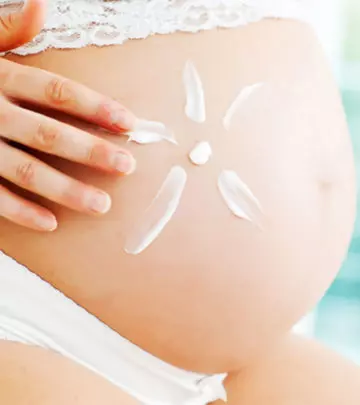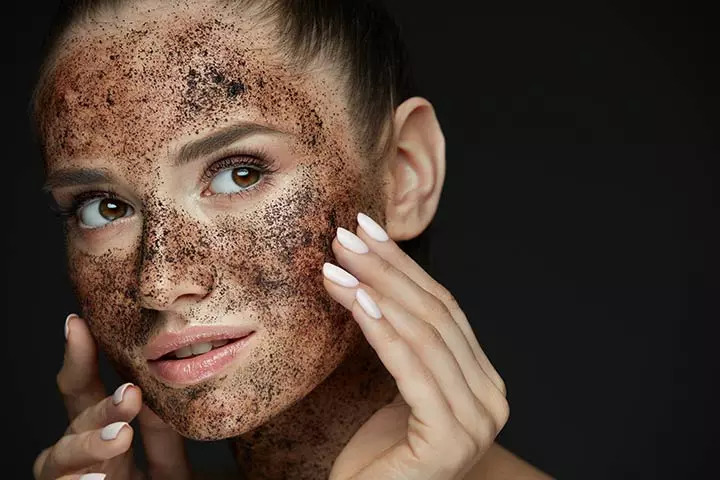
Image: iStock
While being pregnant can be one of the most beautiful and memorable phases of a woman’s life, it comes with its own fair share of challenges. Everything needs extra attention, from your diet, to exercise, to a skincare routine. There’s a sudden burst of hormones in your body, making your skin extra sensitive. Being a mom-to-be doesn’t mean you have to compromise on your skincare. You’ve just got to be aware of what you put on your skin to achieve that pregnancy glow, without harming the little human growing inside you. Below are some skincare rules that you need to follow to take care of your skin during pregnancy.
1. Moisturize, Moisturize, And Moisturize
Moisturize your skin as soon as you step out of the shower, while your skin is still damp. It doesn’t matter what your skin type is, your skin needs the extra hydration to keep itchy and flaky skin at bay. For a mother-to-be, it is best recommended to use more natural and organic products, as it would be a much safer option for both mother and child. Moisturize as frequently as you need, especially in areas where the skin tends to be drier.
2. Hydrate Your Skin
People often get confused between hydration and moisturizing, but hydration is equally important to attain healthy, glowing skin. Dehydrated skin can lead to breakouts, as the sebaceous glands in your skin start producing more oil to combat the lack of water content. Hydration thus helps in locking in the water content in skin cells giving your skin a plumper look
3. Invest In A Good Anti-Stretch Marks Cream
Stretch marks are one of the major concerns for women during their pregnancy. Women are more prone to getting stretch marks around their belly, thighs, and buttocks, as the skin in these areas is rapidly stretching. Investing in a good stretch marks lotion that contains ingredients like cocoa butter, coconut oil, vitamin E, or plant extracts can help reduce the appearance of stretch marks.
4. Check On Your Acne With A Dermatologist
Your hormones go into overdrive whilst pregnant, and this can lead to breakouts. One must not rely on over-the-counter treatments, as this can affect the health of your baby. So it’s always best to consult your dermatologist and seek the right treatment for pregnancy acne.
5. Apply Sunscreen Whenever You Step Out
We can’t stress enough on how important it is to include sunscreen into your everyday skincare routine, and even more so, during pregnancy. As pregnancy makes your skin highly sensitive to the sun, make sure to carry a sunscreen everywhere you go, and reapply every 2 to 4 hours. The UV rays in the sun, when exposed to your skin, can cause visible skin damage and aging. People usually skip sunscreen when it is cloudy. Sure, you cannot see the sun on a cloudy day, but the sun’s rays can easily pass through the clouds, exposing you to the harmful rays. Thus, sunscreen is a must, regardless of whether it is cloudy or sunny outside.
6. Don’t Forget To Exfoliate
Exfoliation is a part of any good skin care regime. While there are many scrubs out there in the market to choose from, or you might even have a favorite brand that you’ve been using for years, it is always better to do a DIY that is gentle and all natural. A simple mix of 1 tablespoon of baking soda, with few drops of vitamin E oil, and some water can do the trick. Gently massage it to make way for smooth and supple skin.
7. Go For Shaving Instead Of Waxing
If your preferred method of hair removal is waxing, it’s better to go for shaving during pregnancy. Though there’s no evidence of it being unsafe, waxing can be more painful than usual, due to heightened skin sensitivity. It can also cause irritation and itching in some cases.
8. See Ya, Retinoids
It is highly advised to not use retinoids during pregnancy, or if you are trying to conceive. Isotretinoin (Accutane), which is a well-known retinoid, is an oral prescription drug primarily used to treat cystic acne. However, usage of retinoid or isotretinoin during pregnancy has known to cause birth defects.
It is always better to check the ingredients before applying anything onto your skin as it can enter the bloodstream and affect the wellbeing of both the child and the mother. So your best bet would be to get a second opinion from your OB-GYN or dermatologist before going for any new treatment or products.





















